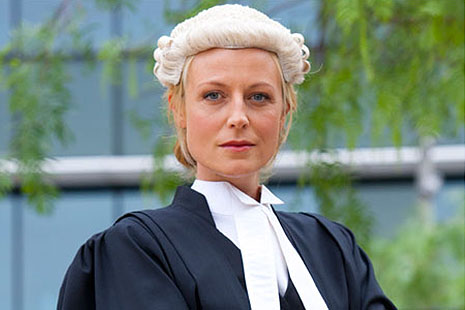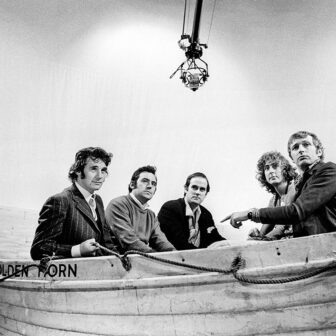THE FINAL episode of the ABC’s legal drama Janet King airs this week, and looks set to do well in the ratings. Audience numbers for the show have held steady at a healthy 820,000 to 830,000 across the series, which suggests that the production team have been doing something right, after the debacle of their previous effort, Crownies (2011).
Crownies, with a hefty promotion budget and a conspicuous determination to achieve popularity at all costs, was something of a fizzer with viewers. Surprisingly, they didn’t seem to be particularly engaged by the portrayal of the Department of Public Prosecutions as a dating agency that conducted a bit of legal business on the side.
The casting of three quite gorgeous young actresses dressed to kill carried shades of Mad Men, though they were given scripts more in the style of Home and Away. One of the secrets of the Mad Men divas is that they are cool as well as hot, but only one character in Crownies had the faintest idea of how to be cool, and that was Janet King. Originally a fairly minor character, King, played by Marta Dusseldorp with an easy grace that set an example one could only wish others had followed, turned out to be an audience favourite.
The reasons for this might have been obvious to anyone other than a production team fixated on their own modelling of what is supposed to appeal. Janet King was a professional. She didn’t risk being caught in flagrante delicto every time someone opened the office door, and she conducted herself with suitable gravitas in court. When she was on screen, she drew you into the case, demonstrating that ethical dilemmas, legal double binds and holes in the evidence are the stuff of gripping drama. The scenes between King and the director of public prosecutions, David Sinclair (Lewis Fitz-Gerald), seemed to belong in a different series from those featuring the younger members of the legal team. It is this more sober aspect of the story that has been given a new lease of life as Janet King.
This time Fitz-Gerald appears in only a handful of episodes, though Peter Kowitz as the newly appointed DPP brings a quality of dryness and restraint that makes him an effective counterpart to Dusseldorp. Other roles have been toned down. The junior prosecutors Erin, Lina and Tatum have, like Elizabeth Bennet’s younger sisters in Pride and Prejudice, at least learned to spend ten minutes a day in a rational manner, and the actresses who play them (respectively Ella Scott Lynch, Andrea Demetriades and Indiana Evans) are given some scope to explore more interesting registers of behaviour. Relieved of the task of being a foil to constant displays of female exhibitionism, Richard Sterling (Hamish Michael) has evolved into a character beset by intricate personal and professional dilemmas.
One of the better ideas behind Crownies – to reverse the focus on the defence that is conventional in legal dramas – comes into its own in Janet King. The ethics of prosecuting a case of apparent euthanasia come under scrutiny in the first episode of the series, when King suddenly decides to take a hard line and push for a manslaughter conviction. In later episodes, a child abuse victim is virtually trapped into giving evidence in a case that may be wrongly conceived. There’s a particularly convincing performance here from Harriet Dyer as the young witness.
King’s personal life becomes a major dimension of the story. Returning to work after a year’s maternity leave, she is seen at the start of the first episode kissing goodbye to her one-year-old twins as a younger colleague looks on, bemused at the way the babies are passed between their two mothers. Janet and Ash (Aimee Pedersen) are models of tolerance and affection towards each other as the stresses mount up. The scriptwriters have rather obviously felt the need for an “all good” portrayal of the same-sex family, struggling for survival as they become the direct target of Janet King’s enemies.
The scriptwriting team is headed by Greg Haddrick, whose experience ranges from suburban melodrama (Home and Away) to the darker worlds of Underbelly and Bikie Wars. It includes Kris Mrksa, one of the writers on The Slap, Jane Allen from the Crownies team, and Shaun Grant, who was responsible for the screenplay of Snowtown. Teams like this have the advantage of varied skills and perspectives, but they can develop entrenched habits.
In this case, two-way dialogue is filmed in shot/reverse shot sequence, the delivery of each line generating a facial reaction. When every spoken statement is reinforced with a meaningful look on the receiving end, the effect is cumbersome and over-explicit. There’s more than one way of leaving something unsaid. Characters frequently include something that sounds like a row of dots in the middle of a line. “He’s… a suspect.” “I… didn’t want to say anything.” “Perhaps if the prosecution had been a little more… rigorous.” This may be partly the fault of the actors, but the banality of the statements invites it. Not all the scripting is at this level, but overall, the series suffers from being overwritten, and the way the camera hangs on the spoken word is indicative of the problem.
I WOULD recommend any Peter Temple novel as a workout for jaded scriptwriters. Temple writes almost entirely in dialogue, in a kind of macho-telegraphese in which no character will use a dozen words where a couple will do. Matt Cameron captures all the right cross-rhythms and ellipses in his adaptation of Temple’s third Jack Irish novel Dead Point for the ABC, screened on Sunday night.
While the ABC should be cautioned against a tendency to overuse certain actors, it is interesting to see how differently they fare with a really good script. Vince Colosimo, whose performance as the chief superintendent of police in Janet King is too stagey for the small screen, hits the right note as a wharfside racketeer in Dead Point. Here, it’s not about the lines, or about any heavily coded body language; a certain kind of bad energy in the character has its own way of signalling, and the writing serves to provide him with the right situations in which to do it.
Marta Dusseldorp is cast as Jack Irish’s girlfriend Linda Hillier, host of a current affairs radio program. Moving from the portrayal of one savvy professional woman to another, it would have been all too easy to replicate her Janet King performance. Yet somehow, everything about her is different. Dusseldorp is agile enough to avoid putting dotted pauses in the lines of even the worst piece of scripting, but the flow of dialogue here allows her to ease into a humorous, syncopated delivery that suits her perfectly. She and Guy Pearce as Jack Irish play against each other with an edge that precludes any sentimentality and an erotic charge that requires no posturing.
Pearce is one of those actors who seems to have an instinct for leading the drama as a whole, establishing its mood and tenor then shifting gears in ways you never quite predict. His scenes with Barry Humphries as an elder statesman under threat of blackmail are pitch perfect. Listening to the familiar cadences of Humphries’s voice, one is always at the ready for the comedian to break through, but anyone who has watched him go from Dame Edna to Sandy Stone in the theatre will be aware that he is first and foremost an actor, and one whose quiet control underlies all the noisier outbursts.
Dead Point is the third of the Jack Irish novels to appear as a telemovie and, like its predecessors Bad Debts and Black Tide, both broadcast in October 2012, it suffers from an overload of action and plot. The ninety-minute format just isn’t adequate to contain the scope of the stories, with their subplots and complex settings. The problem was less acute with the first two, as they came close together and provided a deepening engagement with the various worlds in which Jack Irish is embroiled. A fourth story, White Dog, has been commissioned for television but there is as yet no projected broadcast date. •
• The full series of Janet King can be viewed on iView until 2 May. Dead Point is on iView until 27 April.




